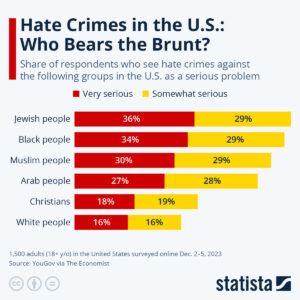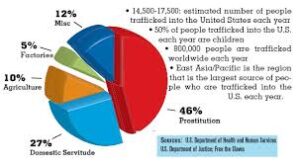Abstract:
Hate crimes represent a particularly egregious form of violence, targeting individuals or groups based on their race, ethnicity, religion, sexual orientation, gender identity, or other characteristics. This essay provides a comprehensive analysis of hate crimes, exploring their causes, consequences, and strategies for prevention. Drawing on insights from sociology, psychology, and criminology, the essay examines the underlying factors contributing to hate crimes, the impact of such crimes on victims and communities, and the role of law enforcement and social interventions in addressing hate-motivated violence. Furthermore, it discusses the challenges in prosecuting hate crimes, the importance of hate crime legislation, and the role of education and community engagement in promoting tolerance and diversity. By shedding light on the complexities of hate crimes, this essay aims to deepen understanding and inform efforts to combat prejudice, discrimination, and violence in society.

Table of Contents:
I. Introduction
II. Definition and Characteristics of Hate Crimes
III. Causes and Motivations of Hate Crimes
A. Prejudice and Stereotyping
B. Social Identity and Group Dynamics
C. Ideological and Extremist Influences
IV. Consequences of Hate Crimes
A. Psychological Impact on Victims
B. Social and Community Effects
C. Underreporting and Secondary Victimization
V. Prosecution and Legal Frameworks for Hate Crimes
A. Challenges in Identifying and Prosecuting Hate Crimes
B. Hate Crime Legislation and Policy Responses
C. Role of Law Enforcement and Criminal Justice System
VI. Prevention Strategies and Interventions
A. Education and Awareness Programs
B. Community Outreach and Dialogue
C. Support Services for Victims and Communities
VII. Case Studies: Notable Examples of Hate Crimes
VIII. Future Directions and Challenges
IX. Conclusion
Introduction:
Hate crimes represent a form of violence motivated by bias, prejudice, or hostility toward individuals or groups based on their perceived characteristics or identities. These crimes not only inflict harm on individual victims but also sow fear and division within communities. Understanding the causes, consequences, and prevention of hate crimes is crucial for fostering social cohesion, promoting tolerance, and upholding the principles of equality and human rights. This essay aims to provide a comprehensive analysis of hate crimes, exploring their definition, characteristics, causes, consequences, and strategies for prevention.

Definition and Characteristics of Hate Crimes:
Hate crimes, also known as bias-motivated crimes or bias crimes,
are criminal offenses committed against individuals or groups based
on their race, ethnicity, religion, sexual orientation, gender identity,
disability, or other protected characteristics.
These crimes may take various forms, including assault, vandalism, harassment, intimidation, and homicide. What distinguishes hate crimes from other criminal acts is the underlying motivation of bias, prejudice, or hatred toward the victim’s perceived identity or group affiliation.
Causes and Motivations of Hate Crimes:
Hate crimes are driven by a complex interplay of individual, social, and ideological factors. Some of the key causes and motivations of hate crimes include:
A. Prejudice and Stereotyping: Hate crimes often stem from deep-seated prejudices, stereotypes, and negative attitudes toward certain groups or communities. Individuals may harbor irrational fears or animosities toward others based on perceived differences in race, religion, or ethnicity, leading them to lash out in acts of violence or aggression.
B. Social Identity and Group Dynamics: Hate crimes may arise from intergroup conflicts and tensions, fueled by competition for resources, perceived threats to group identity, or historical grievances. Social identity theory suggests that individuals derive their sense of self-worth and belonging from their membership in social groups, leading to ingroup favoritism and outgroup hostility.
C. Ideological and Extremist Influences: Hate crimes may be perpetrated by individuals or groups espousing extremist ideologies, including white supremacy, religious fundamentalism, or radical nationalism. These ideologies propagate hateful beliefs and narratives, justifying acts of violence or discrimination against perceived enemies or adversaries.

Consequences of Hate Crimes:
Hate crimes have profound and far-reaching consequences for victims, communities, and society as a whole. Some of the key consequences of hate crimes include:
A. Psychological Impact on Victims: Hate crimes can inflict significant psychological harm on victims, causing feelings of fear, anxiety, and trauma. Victims may experience heightened levels of stress, depression, and post-traumatic stress disorder (PTSD), leading to long-term psychological and emotional scars.
B. Social and Community Effects: Hate crimes can undermine social cohesion, trust, and solidarity within communities, creating divisions and tensions along lines of identity or group affiliation. Communities targeted by hate crimes may experience feelings of vulnerability, marginalization, and exclusion, eroding their sense of belonging and safety.
C. Underreporting and Secondary Victimization: Hate crimes are often underreported due to barriers such as fear of retaliation, mistrust of law enforcement, and stigma associated with victimization. Moreover, victims of hate crimes may experience secondary victimization, including insensitive treatment by authorities, victim blaming, and lack of access to support services.
Prosecution and Legal Frameworks for Hate Crimes:
Prosecuting hate crimes presents unique challenges for law enforcement agencies and criminal justice systems. Some of the key issues and considerations include:
A. Challenges in Identifying and Prosecuting Hate Crimes: Hate crimes can be difficult to identify and prosecute due to factors such as the hidden nature of bias motivations, lack of clear evidence of bias intent, and reluctance of victims to report incidents. Law enforcement agencies may also lack adequate training, resources, and protocols for identifying and investigating hate crimes.

B. Hate Crime Legislation and Policy Responses: Many jurisdictions have enacted hate crime legislation to enhance penalties for offenses motivated by bias or prejudice. These laws recognize the unique harms of hate crimes and seek to deter such offenses through enhanced sanctions and legal protections for victims. However, hate crime legislation varies widely across jurisdictions, leading to inconsistencies in enforcement and prosecution.
C. Role of Law Enforcement and Criminal Justice System: Law enforcement agencies play a crucial role in identifying, investigating, and prosecuting hate crimes, as well as providing support and protection for victims. Effective responses to hate crimes require collaboration between law enforcement agencies, prosecutors, victim advocates, and community organizations, as well as sensitivity to the needs and concerns of affected communities.
Prevention Strategies and Interventions:
Preventing hate crimes requires a multi-faceted approach that addresses underlying causes, promotes tolerance and diversity, and fosters social inclusion. Some of the key prevention strategies and interventions include:
A. Education and Awareness Programs: Education plays a crucial role in promoting tolerance, diversity, and understanding among individuals and communities. Schools, universities, and community organizations can implement anti-bias education programs, cultural competency training, and diversity initiatives to challenge stereotypes, foster empathy, and promote inclusive attitudes.
B. Community Outreach and Dialogue: Building trust and collaboration between law enforcement agencies and communities is essential for preventing hate crimes and promoting public safety. Community policing initiatives, outreach programs, and dialogue forums can facilitate communication, cooperation, and mutual understanding between law enforcement officers and community members, reducing tensions and fostering positive relationships.




